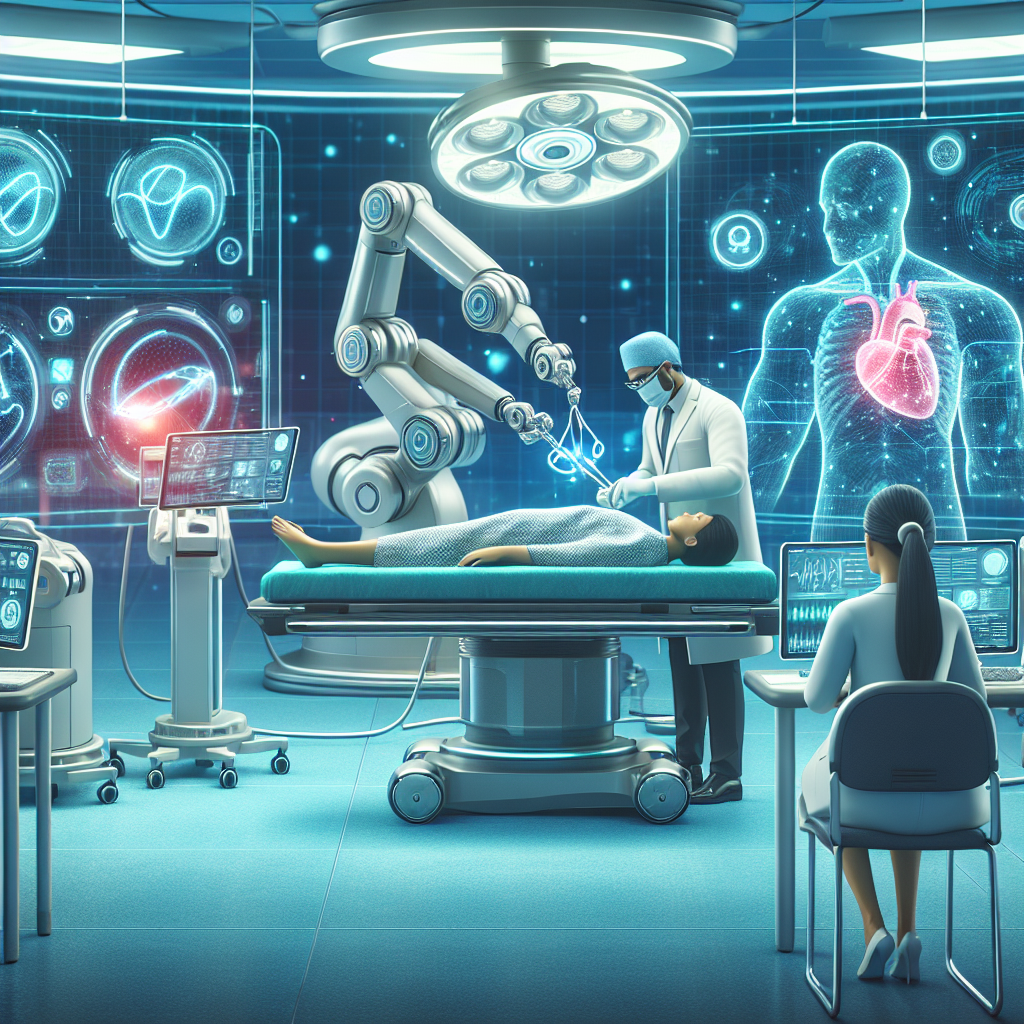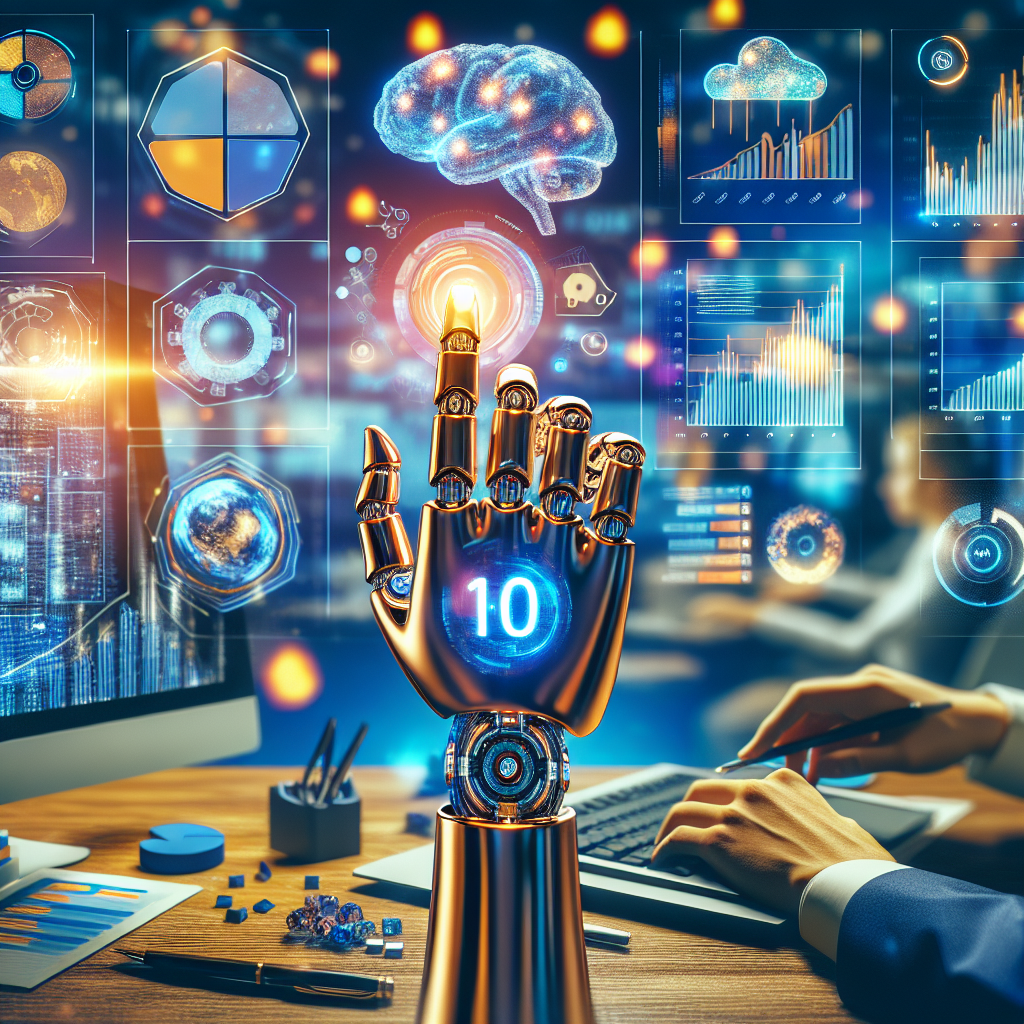Revolutionizing Healthcare: How Artificial Intelligence is Transforming the Medical Landscape
Imagine a world where diseases are diagnosed accurately and efficiently, where treatment plans are personalized and tailored to each individual’s unique needs, and where healthcare professionals have access to vast amounts of medical knowledge at their fingertips. This may sound like something out of a science fiction movie, but it is becoming a reality thanks to the rise of artificial intelligence (AI) in healthcare. AI is revolutionizing the way we approach healthcare, from early detection and diagnosis to treatment and patient care. In this article, we will explore the various applications of AI in the healthcare industry, the benefits it brings, and the challenges it presents.
Artificial intelligence has made significant strides in recent years, and its potential in healthcare is immense. From machine learning algorithms that can analyze medical images and detect abnormalities with greater accuracy than human doctors, to natural language processing systems that can sift through vast amounts of medical literature to provide evidence-based treatment recommendations, AI is transforming every aspect of healthcare. We will delve into how AI is being used in disease prediction and prevention, clinical decision support, drug discovery, and patient monitoring. Additionally, we will discuss the ethical implications of AI in healthcare, such as privacy concerns and the potential for bias in algorithms. As AI continues to advance, it is crucial to understand its capabilities, limitations, and the ethical considerations that come with its implementation in healthcare.
Key Takeaways
1. Artificial intelligence (AI) is transforming the healthcare industry by improving diagnostic accuracy, personalized treatment plans, and patient outcomes.
2. AI-powered technologies such as machine learning algorithms and natural language processing are being used to analyze vast amounts of medical data, leading to faster and more accurate diagnoses.
3. AI is also revolutionizing healthcare research and drug development, enabling scientists to identify patterns and potential treatments more efficiently than ever before.
4. The use of AI in telemedicine and remote patient monitoring is increasing access to quality healthcare, particularly in underserved areas and during public health emergencies.
5. While AI offers tremendous benefits, ethical considerations such as privacy, data security, and algorithm bias need to be addressed to ensure responsible and equitable use of these technologies in healthcare.
: Emerging Trends and Future Implications
Trend 1: AI-Powered Diagnostic Tools
One of the most significant trends in the rise of artificial intelligence in healthcare is the development of AI-powered diagnostic tools. These tools leverage machine learning algorithms to analyze vast amounts of medical data and assist healthcare professionals in making accurate diagnoses. With the ability to process data faster and more accurately than humans, AI diagnostic tools have the potential to revolutionize the healthcare industry.
These tools can analyze medical images, such as X-rays, CT scans, and MRIs, to detect abnormalities and identify potential diseases. By comparing the images to vast databases of similar cases, AI algorithms can provide healthcare professionals with insights and recommendations for treatment. This technology has already shown promising results in various fields, including radiology, pathology, and dermatology.
The implications of AI-powered diagnostic tools are far-reaching. They can help reduce diagnostic errors, which are estimated to affect 12 million Americans each year, leading to severe consequences, including patient harm and increased healthcare costs. By providing accurate and timely diagnoses, AI can improve patient outcomes and enable more efficient resource allocation within healthcare systems.
Trend 2: Predictive Analytics for Personalized Medicine
Another emerging trend in the rise of artificial intelligence in healthcare is the use of predictive analytics to enable personalized medicine. By analyzing large datasets, including patient health records, genetic information, and lifestyle data, AI algorithms can identify patterns, correlations, and risk factors that can help predict individual health outcomes and tailor treatment plans accordingly.
Through predictive analytics, AI can assist healthcare professionals in identifying patients at high risk of developing certain diseases, allowing for early intervention and preventive measures. For example, AI algorithms can analyze a patient’s genetic profile and lifestyle factors to assess their susceptibility to conditions like heart disease, diabetes, or cancer. This information can then be used to develop personalized prevention strategies or recommend specific treatments.
The potential implications of predictive analytics for personalized medicine are immense. It can lead to more targeted interventions, reducing the burden on healthcare systems by preventing the progression of diseases and minimizing the need for costly treatments. Additionally, personalized medicine can improve patient satisfaction and engagement, as individuals receive tailored care that addresses their unique needs and preferences.
Trend 3: AI-Enabled Remote Patient Monitoring
The rise of artificial intelligence in healthcare has also brought about the trend of AI-enabled remote patient monitoring. This technology allows healthcare providers to remotely monitor patients’ vital signs, symptoms, and overall health status using wearable devices and IoT sensors. AI algorithms analyze the collected data in real-time, alerting healthcare professionals to any deviations from normal values or potential health risks.
AI-enabled remote patient monitoring has numerous applications, particularly in the management of chronic conditions and post-operative care. For instance, patients with heart conditions can wear a smartwatch that continuously monitors their heart rate, blood pressure, and activity levels. If any abnormalities are detected, the AI system can notify healthcare providers, enabling early intervention and preventing complications.
The future implications of AI-enabled remote patient monitoring are promising. It can improve patient outcomes by facilitating timely interventions and reducing hospital readmissions. Furthermore, remote monitoring can enhance patient convenience and comfort, allowing individuals to receive care in their own homes while maintaining a connection with their healthcare providers.
The Role of Artificial Intelligence in Diagnosing Diseases
Artificial intelligence (AI) has revolutionized the field of healthcare by enhancing the accuracy and efficiency of disease diagnosis. Machine learning algorithms can analyze vast amounts of patient data, including medical records, lab results, and imaging scans, to identify patterns and predict disease outcomes. For instance, AI-powered diagnostic tools have been developed to detect early signs of cancer, heart disease, and neurological disorders. These tools can analyze images with incredible precision, enabling doctors to make more accurate diagnoses and provide timely treatment. Furthermore, AI algorithms can continuously learn and improve from new data, ensuring that diagnostic accuracy keeps improving over time.
Improving Patient Care with AI-driven Personalized Medicine
Artificial intelligence is transforming healthcare by enabling personalized medicine. By analyzing a patient’s genetic makeup, medical history, lifestyle factors, and real-time health data, AI algorithms can provide tailored treatment plans and medication recommendations. For example, AI-powered chatbots can collect patient information and provide personalized health advice, reducing the need for unnecessary doctor visits. Additionally, AI can help predict patient responses to different treatments, allowing doctors to choose the most effective therapies for individual patients. This personalized approach improves patient outcomes, reduces healthcare costs, and enhances overall patient satisfaction.
Enhancing Medical Imaging and Radiology with AI
AI has made significant advancements in the field of medical imaging and radiology. Machine learning algorithms can analyze complex medical images, such as X-rays, CT scans, and MRIs, to identify abnormalities and assist radiologists in making accurate diagnoses. For instance, AI algorithms can detect early-stage tumors, blood clots, or other anomalies that may be missed by human eyes. This not only saves time but also improves the accuracy of diagnoses, leading to better patient outcomes. Moreover, AI algorithms can be trained to prioritize urgent cases, reducing waiting times for critical patients and improving overall healthcare efficiency.
AI-powered Robotics and Surgical Assistance
Robotic-assisted surgery has become increasingly common in healthcare, thanks to advancements in artificial intelligence. Surgeons can now use robotic systems equipped with AI algorithms to perform complex procedures with greater precision and control. These robotic systems can analyze real-time patient data, provide guidance to surgeons, and even perform certain tasks autonomously. For example, the da Vinci Surgical System has been used in various surgical specialties, including urology, gynecology, and cardiac surgery. AI-powered robotics not only enhance surgical outcomes but also reduce the risk of complications, minimize scarring, and shorten recovery times for patients.
AI and Predictive Analytics for Disease Prevention
Artificial intelligence and predictive analytics are powerful tools for disease prevention. By analyzing large datasets, AI algorithms can identify individuals at high risk of developing certain diseases, such as diabetes or cardiovascular conditions. This enables healthcare providers to intervene early with targeted interventions, lifestyle modifications, and preventive measures. For instance, AI algorithms can analyze patient data to predict the likelihood of a heart attack, allowing doctors to prescribe appropriate medications and lifestyle changes to reduce the risk. By focusing on prevention, AI-driven healthcare can significantly reduce the burden on healthcare systems and improve population health outcomes.
Addressing Ethical and Privacy Concerns in AI Healthcare
While the rise of AI in healthcare brings numerous benefits, it also raises ethical and privacy concerns. AI algorithms rely on vast amounts of patient data, which must be handled securely and in compliance with privacy regulations. Furthermore, there is a need for transparency and accountability in AI decision-making processes. Healthcare providers and policymakers must ensure that AI systems are unbiased, explainable, and fair, to avoid potential discrimination or harm to patients. Additionally, ethical considerations must be taken into account when using AI in end-of-life care or making critical treatment decisions. Striking the right balance between technological advancements and ethical principles is crucial for the responsible implementation of AI in healthcare.
Overcoming Barriers to AI Adoption in Healthcare
Despite the potential benefits, the widespread adoption of AI in healthcare faces several challenges. One major barrier is the lack of interoperability and standardization of healthcare data. To leverage the full potential of AI, healthcare systems need to integrate data from various sources and ensure compatibility between different platforms. Additionally, there is a need for robust cybersecurity measures to protect patient data from breaches and unauthorized access. Furthermore, healthcare professionals need to be trained in AI technologies to effectively utilize and interpret the insights provided by AI systems. Overcoming these barriers will require collaboration between healthcare providers, technology companies, and policymakers to create a supportive environment for AI adoption.
The Future of AI in Healthcare
The future of AI in healthcare is promising. As technology continues to advance, AI algorithms will become more sophisticated and capable of handling complex healthcare challenges. We can expect AI to play a vital role in drug discovery, clinical trial optimization, and remote patient monitoring. Furthermore, AI-powered virtual assistants and chatbots will become more prevalent, providing patients with personalized healthcare guidance and support. The integration of AI with wearable devices and Internet of Things (IoT) technologies will enable real-time monitoring of patient health and early detection of potential issues. With continued research and innovation, AI has the potential to revolutionize healthcare and improve the lives of millions of people worldwide.
The Early Beginnings of Artificial Intelligence in Healthcare
Artificial Intelligence (AI) in healthcare is a concept that has been around for several decades. It can be traced back to the early days of computing when researchers began exploring the potential of machines to assist in medical diagnosis and decision-making.
In the 1960s and 1970s, AI applications in healthcare were primarily focused on rule-based systems. These systems used a set of predefined rules to analyze patient data and provide recommendations to healthcare professionals. While these early attempts showed promise, they were limited in their ability to handle complex medical scenarios.
The Emergence of Expert Systems
In the 1980s, a significant development in AI healthcare came with the emergence of expert systems. Expert systems were designed to mimic the decision-making processes of human experts in specific domains, such as radiology or pathology.
These systems utilized a knowledge base, which contained a vast amount of medical knowledge, and an inference engine, which applied that knowledge to patient data to generate recommendations. Expert systems showed great potential in assisting healthcare professionals with diagnosis and treatment planning.
The Integration of Machine Learning
In the 1990s and early 2000s, machine learning techniques began to be integrated into AI healthcare applications. Machine learning algorithms enabled systems to learn from large datasets and improve their performance over time.
One notable example of this integration was the development of computer-aided diagnosis (CAD) systems. CAD systems used machine learning algorithms to analyze medical images, such as X-rays or mammograms, and identify potential abnormalities. These systems proved to be valuable tools for radiologists, helping them detect early signs of diseases.
The Rise of Big Data and Deep Learning
In recent years, the availability of big data and advancements in deep learning algorithms have revolutionized AI in healthcare. Big data refers to the vast amount of patient data, including electronic health records, medical images, and genomic data, that can be analyzed to extract meaningful insights.
Deep learning, a subset of machine learning, has shown remarkable success in various healthcare applications. Deep learning models, such as convolutional neural networks (CNNs) and recurrent neural networks (RNNs), have achieved state-of-the-art performance in tasks like image recognition, natural language processing, and predictive modeling.
Current State and Future Outlook
Today, AI in healthcare has reached a level where it is being deployed in real-world settings. AI-powered systems are assisting healthcare professionals in various tasks, such as diagnosing diseases, predicting patient outcomes, and personalizing treatment plans.
For example, AI algorithms can analyze medical images and detect abnormalities with high accuracy, potentially reducing the time and cost of diagnosis. Natural language processing techniques enable AI systems to extract relevant information from unstructured clinical notes, aiding in clinical decision-making.
Looking ahead, the future of AI in healthcare holds tremendous potential. With the continued advancement of AI technologies, we can expect to see further improvements in disease detection, treatment optimization, and healthcare delivery.
However, challenges remain, including the need for robust data privacy and security measures, regulatory frameworks, and ethical considerations. It is crucial to ensure that AI in healthcare is implemented responsibly and in a way that benefits both patients and healthcare professionals.
FAQs
1. What is artificial intelligence (AI) in healthcare?
Artificial intelligence in healthcare refers to the use of advanced technologies, such as machine learning and natural language processing, to analyze and interpret medical data. It involves the development of algorithms that can mimic human intelligence to assist in diagnosis, treatment, and decision-making processes in healthcare.
2. How is AI being used in healthcare?
AI is being used in various ways in healthcare, including medical imaging analysis, predictive analytics, virtual assistants, robot-assisted surgery, and drug discovery. It can help healthcare professionals in diagnosing diseases, predicting patient outcomes, improving patient care, and enhancing operational efficiency.
3. Is AI replacing doctors and healthcare professionals?
No, AI is not replacing doctors and healthcare professionals. Instead, it is designed to augment their capabilities and assist them in making more accurate and informed decisions. AI systems can analyze vast amounts of medical data and provide insights that can aid healthcare professionals in their work, but the final decision-making still rests with the human healthcare providers.
4. How can AI improve patient care?
AI can improve patient care in several ways. By analyzing patient data and medical records, AI systems can identify patterns and predict potential health issues, allowing for early intervention and preventive measures. AI can also help personalize treatment plans, reduce medication errors, and enhance patient monitoring and follow-up care.
5. What are the benefits of using AI in healthcare?
The benefits of using AI in healthcare are numerous. It can lead to improved accuracy and speed in diagnosis, reduced healthcare costs, enhanced patient outcomes, and increased efficiency in healthcare delivery. AI can also help address the shortage of healthcare professionals by automating routine tasks, allowing healthcare providers to focus on more complex and critical cases.
6. Are there any challenges or concerns with AI in healthcare?
While AI has great potential in healthcare, there are also challenges and concerns that need to be addressed. These include data privacy and security issues, ethical considerations, algorithm bias, and the need for regulatory frameworks to ensure the safe and responsible use of AI in healthcare.
7. Can AI make healthcare more accessible?
Yes, AI has the potential to make healthcare more accessible, especially in underserved areas. With AI-powered telemedicine and remote monitoring systems, patients can receive quality healthcare services regardless of their geographical location. AI can also assist in triaging patients, prioritizing care, and reducing waiting times.
8. How can AI contribute to medical research and drug discovery?
AI can contribute to medical research and drug discovery by analyzing vast amounts of biomedical data and identifying patterns or relationships that may not be apparent to human researchers. AI algorithms can help in the discovery of new drugs, repurposing existing drugs, and predicting drug responses based on individual patient characteristics.
9. Is AI being widely adopted in healthcare?
AI is being increasingly adopted in healthcare, although the level of adoption varies across different regions and healthcare settings. Many hospitals and healthcare organizations are exploring AI solutions to improve patient care, enhance operational efficiency, and address healthcare challenges. However, there are still barriers to widespread adoption, including cost, interoperability, and resistance to change.
10. What does the future hold for AI in healthcare?
The future of AI in healthcare is promising. As technology advances and more data becomes available, AI will continue to play a significant role in transforming healthcare delivery. We can expect further advancements in areas such as precision medicine, genomics, remote patient monitoring, and personalized healthcare. However, it is crucial to ensure that AI is implemented ethically and responsibly to maximize its benefits while minimizing potential risks.
Concept 1: Machine Learning
One of the key concepts driving the rise of artificial intelligence (AI) in healthcare is machine learning. Machine learning is a technique that allows computers to learn and make predictions or decisions without being explicitly programmed. In other words, it enables computers to analyze large amounts of data and identify patterns or insights that can be used to improve healthcare outcomes.
Think of machine learning as a process similar to how we learn as humans. When we are exposed to new information or experiences, we learn from them and use that knowledge to make better decisions in the future. Machine learning works in a similar way. It takes in a vast amount of data, such as medical records, lab results, and patient demographics, and uses algorithms to find patterns and relationships within the data.
For example, machine learning algorithms can analyze thousands of medical images, such as X-rays or MRIs, to identify patterns that indicate the presence of certain diseases or conditions. This can help radiologists and other healthcare professionals make more accurate diagnoses and provide better treatment options.
Concept 2: Natural Language Processing
Another important concept in the rise of AI in healthcare is natural language processing (NLP). NLP is a branch of AI that focuses on the interaction between computers and human language. It allows computers to understand, interpret, and generate human language in a way that is meaningful and useful.
When it comes to healthcare, NLP can be used to analyze and extract information from medical documents, such as electronic health records or medical literature. This can help healthcare professionals quickly access relevant information and make informed decisions.
For example, imagine a doctor wants to find the latest research on a particular treatment for a rare disease. Instead of manually searching through numerous medical journals and articles, NLP algorithms can quickly scan through the vast amount of medical literature and extract relevant information. This saves time and allows doctors to stay up-to-date with the latest advancements in their field.
Concept 3: Predictive Analytics
Predictive analytics is another powerful concept in the rise of AI in healthcare. It involves the use of historical data and statistical algorithms to make predictions about future outcomes or events. In healthcare, predictive analytics can be used to identify individuals who are at risk of developing certain diseases or conditions.
By analyzing large datasets that include information about patients’ medical history, lifestyle, and genetic factors, predictive analytics algorithms can identify patterns and risk factors that may contribute to the development of diseases. This information can then be used to develop personalized prevention strategies or interventions.
For example, predictive analytics can be used to identify individuals who are at high risk of developing diabetes. By analyzing data such as age, body mass index, blood pressure, and blood glucose levels, predictive analytics algorithms can provide personalized recommendations for lifestyle changes or interventions that can help prevent the onset of diabetes.
Overall, the rise of artificial intelligence in healthcare is revolutionizing the way we diagnose, treat, and prevent diseases. Machine learning, natural language processing, and predictive analytics are just a few of the complex concepts driving this transformation. By harnessing the power of AI, healthcare professionals can provide more accurate diagnoses, access relevant information more efficiently, and develop personalized treatment plans that improve patient outcomes.
In conclusion, the rise of artificial intelligence (AI) in healthcare has brought about significant advancements and improvements in various areas of the industry. AI-powered technologies have proven to be invaluable tools in diagnosing diseases, predicting patient outcomes, and assisting in surgical procedures. The ability of AI algorithms to analyze vast amounts of data and recognize patterns has led to more accurate diagnoses and personalized treatment plans, ultimately improving patient outcomes and reducing healthcare costs.
Furthermore, AI has also revolutionized the healthcare system by streamlining administrative tasks, automating workflows, and enhancing the overall efficiency of healthcare providers. With AI-powered chatbots and virtual assistants, patients can receive instant medical advice and support, reducing the burden on healthcare professionals and improving access to care. Additionally, AI has the potential to address healthcare disparities by bridging the gap between urban and rural areas, where access to specialized healthcare services is limited.
However, as AI continues to evolve and become more integrated into healthcare systems, it is crucial to address the ethical and privacy concerns associated with this technology. Safeguarding patient data and ensuring transparency in AI algorithms are paramount to maintain trust in the healthcare system. As AI continues to advance, it is essential for healthcare professionals, policymakers, and society as a whole to collaborate and establish guidelines and regulations to harness the full potential of AI while upholding patient safety and privacy.



